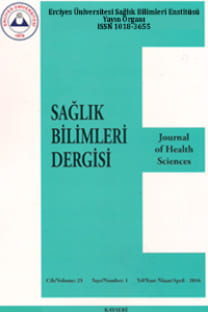SOMATOSTATİN ANALOGLARI İLE GÜNCEL TEDAVİ YAKLAŞIMLARI
Vapreotid, Oktreotid, nörodejenerasyon, antikanser
CURRENT TREATMENT APPROACHES WITH SOMATOSTATIN
Vapreotide, Octreotide, neurodegeneration, anticancer,
___
- RxMediaPharma® 2019, İnteraktif İlaç Bilgi Kaynağı. Prof. Dr. Levent Üstünes, (Ed.), Gemaş Yayıncılık.
- Perez J, Hoyer D. Co-expression of somatostatin SSTR-3 and SSTR-4 receptor messenger RNAs in the rat brain. Neuroscience, 1995; 64(1): 241-253.
- Ludvigsen E, Stridsberg M, Taylor JE, Culler MD, Öberg K, Janson ET. Subtype selective interactions of somatostatin and somatostatin analogs with sst 1, sst 2, and sst 5 in BON-1 cells. Medical Oncology, 2004; 21(3): 285-295
- Ferjoux G, Bousquet C, Cordelier P, Benali N, Lopez F, Rochaix P, Buscail L, Susini C. Signal transduction of somatostatin receptors negatively controlling cell proliferation. J Physiol Paris, 2000; 94(3): 205-210.
- Denwood G, Tarasov A, Salehi A, Vergari E, Ramracheya R, Takahashi H, Nikolaev VO, Seino S, Gribble F, Reimann F, Rorsman P, Zhang Q. Glucose stimulates somatostatin secretion in pancreatic δ-cells by cAMP-dependent intracellular Ca2+ release. J. Gen. Physiol, 2019; 151(9): 1094-1115.
- Hoyer D, Lübbert H, Bruns C. Molecular pharmacology of somatostatin receptors. Naunyn Schmiedebergs Arch Pharmacol, 1994; 350(5): 441-453.
- https://ncim.nci.nih.gov/ncimbrowser/ConceptReport.jsp?dictionary=NCI%20Metathesaurus&code=C0164678, Erişim tarihi: 22.07.2019
- Rai U, Thrimawithana TR., Valery C, Young SA. Therapeutic uses of somatostatin and its analogues: current view and potential applications. Pharmacol. Ther, 2015; 152: 98-110.
- Banks WA, Schally AV, Barrera CM, Fasold MB, Durham DA, Csernus VJ, Groot K, Kastin AJ. Permeability of the murine blood-brain barrier to some octapeptide analogs of somatostatin. PNAS, 1990; 87(17): 6762-6766.
- https://www.drugbank.ca/drugs/DB04894, Erişim tarihi: 10.08.2019
- https://www.drugbank.ca/drugs/DB00104, Erişim tarihi: 13.10.2019
- Hannon JP, Nunn C, Stolz B et al. Drug design at peptide receptors. J Mol Neurosci, 2002; 18(1-2): 15-27.
- Kéri G, Schwab R, Szokoloczi O, Szüts T, Szolcsanyi J. TT-232: An anti-tumour and anti-inflammatory peptide therapeutic in clinical development. International Journal of Peptide Research and Therapeutics, 2005; 11(1): 3-15.
- https://www.drugbank.ca/drugs/DB06791, Erişim tarihi: 13.10.2019
- https://www.drugbank.ca/drugs/DB06663, Erişim tarihi: 13.10.2019
- http://www.chemspider.com/, Erişim tarihi: 13.10.2019
- Borbély É, Scheich B, Helyes Z. Neuropeptides in learning and memory. Neuropeptides, 2013; 47(6): 439-450.
- Vécsei L, Bollok I, Telegdy G. Intracerebroventricular somatostatin attenuates electroconvulsive shock-induced amnesia in rats. Peptides, 1983; 4, 293– 295.
- Nakagawasa O, Hozumi S, Tan-No K, Niijima F, Arai Y. Yasuhara H, Tadano T. Immunohistochemical fluorescence intensity reduction of brain somatostatin in the impairment of learning and memory-related behaviour induced by olfactory bulbectomy. Behav. Brain Res, 2003; 142: 63–67.
- Wilson RS, Martin EM. New intrathecal drugs in Alzheimer's disease and psychometric testing. Ann N Y Acad Sci, 1988; 531(1): 180-186.
- Dutar P, Vaillend C, Viollet C, Billard JM, Potier B, Carlo AS, Ungerer A, Epelbaum J. Spatial learning and synaptic hippocampal plasticity in type 2 somatostatin receptor knock-out mice. Neuroscience, 2002; 112: 455–466.
- Woltering E.A., Watson J.C., Alperin-Lea R.C., Sharma C., Keenan E., Kurozawa D., Barrie R., Somatostatin analogs: angiogenesis inhibitors with novel mechanisms of action, Invest. New Drugs, 1997; 15: 77–86.
- Reubi J.C., Horisberger U., Laissue J., High density of somatostatin receptors in veins surrounding human cancer tissue: role in tumor-host interaction?, Int. J. Cancer, 1994; 56: 681–688.
- ISSN: 1018-3655
- Yayın Aralığı: 3
- Başlangıç: 1993
- Yayıncı: Prof.Dr. Aykut ÖZDARENDELİ
ÇOCUKLARDA YANIK DURUMUNDA ANNELERİN YAPTIKLARI GELENEKSEL UYGULAMALAR
DİJİTAL GÜLÜŞ TASARIMI: KULLANILAN SİSTEMLER VE AVANTAJLARI
BAZI BİYOMALZEMELERİN DOKU KAPATMA YAPIŞTIRICISI OLARAK KULLANIMININ DEĞERLENDİRİLMESİ: İLK SONUÇLAR
Meryem EREN, Meryem ŞENTÜRK, Ayhan ATASEVER, Görkem EKEBAŞ, Duygu YAMAN GRAM
ÇOCUKLARDA YABANCI CİSİM YUTULMASINDA BÜYÜK TEHLİKE: PİLLER
Sebahat ALTUNDAĞ, Zehra ÇALIŞKAN
BAĞIMLI BAKIM TEORİSİNİN KAVRAM ANALİZİ
Aylin AYDIN SAYILAN, Sacide YILDIZELİ TOPÇU
Görkem EKEBAŞ, Ayhan ATASEVER, Meryem ŞENTÜRK, Duygu YAMAN GRAM, Meryem EREN
ÇOCUK VE ERGENLERDE D VİTAMİNİ DÜZEYİNİN YAŞ, CİNSİYET, YERLEŞİM YERİ VE MEVSİM İLE İLİŞKİSİ
Sevil OKAN, Fatih OKAN, Osman DEMİR
